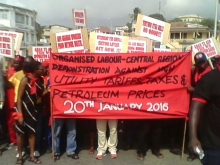Workers in Ghana demonstrate against massive increase in utility tariffs

Organised labour had been negotiating with the government over the 59.2% electricity and 67.2% water tariff increases introduced in early December 2015, when the government imposed a further 28% increase on petroleum product prices early January 2016 at a time when the world price of crude oil is in fact falling below $30 per barrel.
The increases take place in the context of a debate around whether privatisation of the electricity sector will provide stable supplies of electricity. Failure to conduct regular maintenance and upgrades at power plants has led to chronic power cuts. In February 2015, President John Mahama had promised to fix the country's power problems before 2017.
Ghana’s inflation rate in December 2015 was at 17.7% and the government had only budgeted a 10% increase in salary for public sector workers for 2016. The consequent 7% decline in public sector purchasing power combined with astronomical increases in taxes, levies and utility prices brought workers and citizens in a nationwide protest of the situation, marching through the streets of Accra and throughout the country.
Organised labour will gauge government response and is likely to begin a nationwide strike if government remains intransigent.
PSI fully supports its affiliates in Ghana and reaffirms its belief in the public alternative to privatisation and the need for national and local governments to pursue the development of infrastructure by using public finance for investment, and public-sector organisations to deliver quality public services for all.
For more information:
- See PSI's work around privatisation
- Follow PSI's work in Africa & arab countries on our website and Facebook
- See more photos on Flickr

